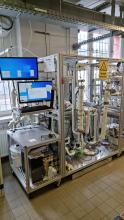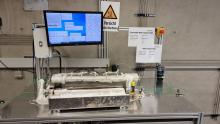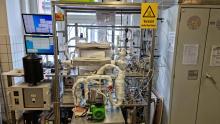Work in the field of exhaust gas purification is concerned with the use of catalytic converters to reduce pollutants in engine and industrial exhaust gases. In particular, the pollutants NOx, N2O, CH4, HC, soot and CO are the focus of interest. The aim is to develop innovative catalysts and new, efficient processes to reduce emissions.
A central part of the research activities pursues the concept of developing a fundamental understanding of the surface chemistry of exhaust gas catalysts, using in particular iron and manganese oxides as well as the precious metals platinum and palladium. The research addresses the determination of the type of active centers, reaction mechanism and intrinsic kinetics. On this basis, global and elementary kinetic models as well as structure-activity relationships are then created, on the basis of which the targeted, i.e. knowledge-based development of new catalysts and exhaust gas purification technologies is made possible.
Another key objective is to replace the precious metals platinum and palladium primarily used in exhaust gas purification with sustainable and economical catalyst materials (e.g. iron and manganese oxides as well as mixed oxides). Reactor modeling, which is used to investigate the coupling of chemical reaction and physical transport processes, is also an essential part of the work. Finally, the catalyst and the corresponding reactor are designed on the basis of this knowledge.
The following fields of application are currently being addressed:
- NOx reduction using NH3 according to the SCR process (Selective Catalytic Reduction) on V2O5/WO3/TiO2, Fe/BEA zeolite and Fe2O3/Al2O3 catalysts for O2-rich engine and industrial exhaust gases
- SCR conversion using AdBlue in motor vehicles for the on-board release of NH3 (urea SCR)
- NOx reduction using H2 on platinum and palladium catalysts in O2-rich exhaust gases (H2-DeNOx), e.g. for lean-burn H2 combustion engines and low exhaust gas temperatures
- Decomposition of N2O on Fe2O3/Al2O3 catalysts in industrial exhaust air
- Soot oxidation on iron oxide and manganese oxide catalysts in the exhaust gas of diesel engines and DI Otto engines
- Oxidation of CO, HC and NO on platinum-, palladium- and iron oxide-based oxidation catalysts under lean conditions (e.g. diesel exhaust gas)
- CO oxidation under stoichiometric conditions on three-way catalysts, in particular Pd/Al2O3 model catalysts
- CH4 and HCHO oxidation in O2-rich engine exhaust gases on precious metal-containing and precious metal-free catalysts
- CH4 oxidation on precious metal-free catalysts for O2 removal from biogas


